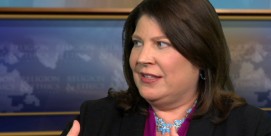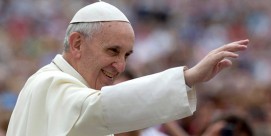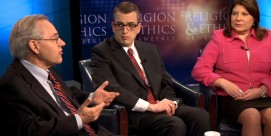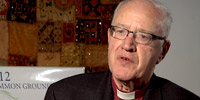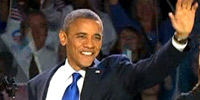BOB ABERNETHY, host: Welcome, I’m Bob Abernethy. It’s good to have you with us for our annual look ahead at what the top religion and ethics stories of the new year might be. E.J. Dionne is here. He is a senior fellow at the Brookings Institution in Washington, a columnist for the Washington Post, and a professor at Georgetown University. Kevin Eckstrom is the editor-in-chief of Religion News Service, and Kim Lawton is managing editor of this program. As preparation for our discussion, we spoke with a great variety of young leaders about the things they expect and want to happen in 2014.
PROFESSOR CANDIDA MOSS (Department of Theology, University of Notre Dame): I think that the most important religious and ethical questions of 2014 are going to be us trying to pull apart what church and state means. How do we negotiate different sets of religious freedoms?
RYAN ANDERSON (Heritage Foundation): How will we be treating the unborn in America, particularly with respect to government law that is coercing people into disrespecting the rights of the unborn? And so we see this in a religious liberty context with the HHS mandate cases that are going to go before the Supreme Court.
AMEY VICTORIA ADKINS (Duke Divinity School): I think the most important issues are really going to be surrounding questions of our educational system as well as our health care system. Questions of public access, particularly as historically minority communities have had a lot of trouble in terms of having equal and equitable access to health care and to education, things that really affect our communities.
SIMRAN JEET SINGH (Senior Religion Fellow, Sikh Coalition): The most significant ethical issue, the broad umbrella, would be discrimination. Sikh Americans are subjected to, and targeted in, discrimination on a daily basis, and there are many ways in which this emerges. Currently Sikh Americans are not allowed to serve with their turbans and beards in the armed forces. So this is a major issue that we’re hoping to address.
AAMIR HUSSAIN (Interfaith Youth Core): A lot of people who get the most press from our community are people who are extremists, who don't actually represent the majority of Muslims. So I think as a young person, as someone who's growing up in the United States, it's our job to kind of stand up to these people and to speak out against them to the media, or things that we write to show that what Islam really is about is not about violence. It's about peace and understanding.
JENNY YANG (Vice President of Advocacy and Policy, World Relief): When we talk about immigration, there's a lot of reasons--first I think it's because people who are impacted. This is about people whom we worship with on Sundays and who are our neighbors and who really are our friends and community members. But secondly, it's also important for evangelicals because there's a scriptural mandate that as Christians we're called to welcome the stranger among us.
SHAWN LANDRES (Co-Founder, CEO, and Director of Research, Jumpstart): Younger Jews are actually more likely than older Jews to give to Jewish organizations working in their neighborhood and community and to international aid. And that raises a key question that I think we'll be confronting , young people, not just Jews, in 2014, which is when there's so much need at home, how can we justify giving charitable gifts around the world? And when there’s so much need around the world, how can we not justify giving those gifts away?
JAY KANSARA (Associate Director of Government relations, Hindu American Foundation): Hindus are going to be increasingly looking at their religious, scriptural background in order to address a growing issue for all of society and that is climate change and how we as humanity treat our environment.
MICHAEL FRIEDMAN (Georgetown University): Ninety-two percent of Reform Jews support homosexuality, and 20 percent of Ultra-Orthodox Jews support homosexuality, which is a very surprising number. But at the same time, you're not seeing any theological action, I think, coming from those spheres to try to articulate why this is an important issue. It would be a very helpful thing, it would be a very important thing for the Jewish world to articulate why gay rights is consistent with a religious message.
ANDERSON: How are we guaranteeing or furthering, advancing the goal of having a married mom and dad for every child? So the question of marriage definition, marriage redefinition, but just more broadly of a marriage culture. Are Americans fostering the type of culture in which every child is viewed as a gift of God, has a right to life, but also has a right to life inside of a marital family, inside of a family that connects that child with his or her mom and dad?
PROFESSOR NAJEEBA SYEED-MILLER (Interreligious Education, Claremont School of Theology): I think gun control is a big issue and how to do violence prevention and whether it's violence that happens based--that's random, or violence that's targeted based on any particular reason. I think there's a lot of concern about how do we address this issue? There isn't maybe one solution, but how do we get together across different religious traditions and people without religious traditions to solve the violence that seems to be hitting our country again and again in different ways.
ADKINS: Is it safe to be young and black anywhere in this country? Is it safe to ask your neighbor for help out of fear they might shoot you?
VICTORIA RAMIREZ (Director of Focus Leadership Institute, Focus on the Family): So I think life's going to be on the forefront of a lot of our minds--understanding what that means from beginning to end and how we treat life and value it.
MOSS: For young Catholics in America, we've seen a lot of polarization between conservatives and liberals and a sort of a battle and a no-man's-land in between them about what does it mean to be Catholic in America? What are the key issues for us? But with Pope Francis we're seeing something new. We're seeing lots of conversation about dialogue and empathy.
ABERNETHY: So Kevin, welcome to you all, and what do you see ahead with Pope Francis?
KEVIN ECKSTROM: Well, if 2014 is anything like 2013 was we're going to have to rename it the Pope Francis News Service because he keeps us so busy. You know, the one thing we can say for sure is to expect the unexpected from this pope. He's going to keep everyone on their toes, but I think three things that are worth watching. One is in February he'll be naming a bunch of new cardinals. It will be interesting to see who gets a red hat out of that. Number two he's going to make formal saints out of John Paul II and Pope John XXIII, and it will be interesting to see the similarities drawn between him and especially John XXIII. But I think the most important thing is in October he's calling a bunch of bishops together to Rome to discuss issues relating to the family, but that's broad enough to include issues of abortion and marriage and contraception and, as a sign of how remarkable this papacy is turning out to be, he's actually asked Catholics around the world what they think about this. What do they know about Church teaching? Do they pay any attention to it? Do they care about it? And so the fact the bishops are going to be coming together with at least some kind of input from the laity, I think, will be fascinating.
ABERNETHY: Kim, do you see anything coming out of this meeting in the way of change about, for instance, divorced and remarried Catholics?
KIM LAWTON: Well, that's one issue that it seems like they might be some at least frank discussions if not changes on whether Catholics who've been divorced and then remarried may take communion. Currently they cannot. But I think that is the big question. We've seen a change in style, a change in tone, but will that translate into changes in Church teachings, into changes in how Catholics approach things, policies, and that will be interesting. I think that's where Pope Francis is going to have maybe some challenges because there are a lot of expectations from a lot of different groups: “This is my pope. He's going to do what I want.” And, you know, in fact, expectations may be high, but he may not make any changes to teachings or policies, and then the question is will that be enough of a different kind of change?
E.J. DIONNE: But, you know, I think that, for example, Kevin was right to mention naming the cardinals. They are the people who elect the next pope. And I think so much of the question about Pope Francis is what kind of change will he make in the Church that will be durable over time? If you think of John the XXIII he was an extraordinary pope. One of the reasons we look back upon him as an extraordinary pope is he called the Second Vatican Council. The Second Vatican Council institutionalized a series of changes in the Church. And I think the challenge to Francis is that if he wants a papacy that transforms the Church, in which ways will he choose to institutionalize those changes? But the other thing I think we can expect is more preaching and more clarification on exactly what does he mean by the Church's commitment to social justice and the poor, because I think that will remain a central part of his papacy, and I think both in his actions and in his words he's going to give us even more clarity about what that means for the Church on a day-to-day basis.
LAWTON: And how the U.S. bishops, for example, I mean in every context, but here in the U.S., how the U.S. church adopts and implements some of the things that he's talking about. I mean I think that's going to be coming up when you're talking about issues having to do with the poor, immigration, some of these other policy issues. Will we see the U.S. bishops focusing more on those and less on some of the traditional issues like abortion, gay marriage?
DIONNE: And I think you've already begun to see in the American church a shift, and it's not a new shift. The American church used to talk a great deal about these issues back in the mid-1980s when they put out very strong statements on war and on economic justice, and I think you're seeing a move back toward that emphasis already, but I agree with you. I think it's going to be a test of how much that's accelerated in the coming year.
ABERNETHY: There's talk of a papal trip to where, the Middle East?
LAWTON: We expect the pope to go to the Middle East: Jordan, Israel, Palestinian territories. I'll be watching to see will he use this popularity, this great, you know, approval that he has to really throw his moral authority behind some of those tough issues like peace in the Middle East. Dealing with the issue of Syria, the Syrian refugee crisis which is spiraling out of control. And to what extent will he use that popularity to really, you know, look at some of those tough issues around the world?
ABERNETHY: Are we expecting too much?
DIONNE: Well, I think that we're not. I mean, he's delivered so far, you know, and yes, I think that he can't be all things to all people, and yet it's remarkable the degree to which he has pulled that off so far. And yes, there are some traditionalists who have doubts about the direction he is taking, but even among the traditionalists, they realize that people are paying attention to the Catholic and the Christian message in a way they were not paying attention to it before Francis became pope.
ABERNETHY: And I think outside the Catholic Church as well as within it.
DIONNE: Oh, absolutely. In fact, in some ways I think two of his particular audiences are non-Catholics and ex-Catholics. Because I think all of us have run into people who drifted away from the Church, who suddenly have Pope Francis there, and they're taking a second look now.
ABERNETHY: And Kevin, there are some important Supreme Court decisions that we expect in 2014. Let's get into that.
ECKSTROM: Yeah, so there's two. One is a case that was actually argued last year in 2013 that will be decided in 2014, Greece v Galloway, which is basically a question of how religious, or how sectarian prayers can be at civic events. It's involving a town in upstate in New York where the people said the prayers were too Christian. The Court is going to be asked to decide where is that line between too Christian, or too Jewish, or too whatever. Should there even be a line on questions on that? The other important, huge case is a challenge to ObamaCare, the Affordable Care Act, about particularly the provision that says employers have to provide contraception coverage at no cost to their employees. There's a challenge brought by an evangelical-owned company that says we don't object to all forms of birth control, but there are some that we do object to, and we shouldn't be forced to provide those in our company, and ultimately the Supreme Court's going to have to decide.
ABERNETHY: So it's not just Catholic institutions and universities that are involved, but now businesses, too.
LAWTON: Right. And one of the other cases before the Supreme Court includes a Mennonite business who also looks at some forms of birth control as abortion. And there are lots of other cases still bubbling up in the pipeline as well, from faith-based institutions like hospitals, universities, Catholics, evangelicals. And again, the issue is who defines what is a religious institution that is deserving of government exceptions or benefits? Those are tricky, tricky questions in a country that's increasingly pluralistic, just like the prayer case. In a country that's increasingly diverse, how does religion get exercised in America?
DIONNE: The one involving business is really a novel kind of case. In other words, the argument about what government can and can't do with religious institutions is one we've been having for a long time, but this assertion of a right to cover this and not that in an insurance plan by a company...
LAWTON: The for-profit business, yeah.
DIONNE: ...where after all it is a corporation. In many cases we're talking about corporations, so it's not the individual person but the corporation itself that's asking for this right. So this is going to be a complicated, and I think whatever the outcome, a very controversial decision.
ABERNETHY: But is the other case, the Greece, New York case--are people saying the government should have a role in deciding what kind of prayer there should be before a meeting of a town council?
ECKSTROM: Well, that is the question, and even some of the folks who...
ABERNETHY: Is that the government's business?
ECKSTROM: Right, and a lot of people who say there should be perhaps less religion in public life, they don't want the government deciding what religion should or shouldn't be. So I think what a lot of people are looking for the Court to do is not necessarily draw a rule saying this is what you can say, this is what you can't say, but maybe some more standards or guidelines: this kind of thing would be acceptable, this sort of thing would not, but then leave the actual prayers up to the clergy.
DIONNE: We have chaplains in the Congress who open with prayer, so this is a kind of debate we keep having over and over again. Are we simply going to say we're getting rid of that, which would be really quite a radical change. But then when you're talking about a local government, if you have an overwhelming majority of one faith and a small minority in another faith, you can imagine that small minority can feel oppressed by a prayer representative only of the broad majority. Normally, public institutions have solved this question in a pluralistic way by inviting different people from different traditions to give prayers. But I think it's going to be very interesting to see. I think this Court is unlikely to say no, you can't have the public prayer. It's going to be interesting how much leeway it affords.
ABERNETHY: What do you all expect to see with respect to the Affordable Care Act in this new year? Is it going to be successful? Is it going to fail some more? What do you see ahead, especially since 2014 is an election year?
DIONNE: Well, I'm fairly out there wanting it to work, so I should just say that up front. And I think the test is, will it enroll a lot of new people in health insurance? We talked a little about that last week, and I think the answer is yes. And the question is will that matter most, or will some problems that people have with their own insurance--some of it attributable to the Affordable Care Act, some not--all get blamed on the Affordable Care Act? But I think the test will be in the numbers. And that if it insures a lot of new people, I think perhaps not the strong opponents of it, but I think middle-of-the-road people who are unhappy with the kick-off, but are not necessarily against the idea of expanding health insurance, those people, I think their judgment will hang entirely on how well is it doing at delivering on its promise.
LAWTON: And I think E.J.'s right that it sort of depends on how it goes early on, and the political implications in an election year, a mid-term election year, are also dependent on that. The Republicans really made that a big issue last year in the government shutdown, and then there was backlash for that. It's always in the details or what's happening right before you, but I think it could be a big issue in the election. It'll be interesting to watch, I think on the Republican side, some of these splits that we're seeing between the social conservatives, the economic conservatives, and those who want the party to maybe go in a less hardline direction. And how that gets worked out will certainly be setting the stage for the next presidential election as well.
ABERNETHY: Is there any reason to hope that Congress is going to get itself together and be anymore able to act on some of these issues that are very important to the religious communities: Immigration? Gun violence maybe?
DIONNE: Just say no and be done with it? Hope in this case is hard to come by. I think, and I’ll probably talk a little about this toward the end of the show, that immigration is an issue that won’t go away. It’s going to stay with us, partly because of the size of the Latino community, partly because of the religious institutions' engagement in it, partly because of the business community’s engagement in it. And while you’ve had more resistance on the Republican side, I think these groups, particularly the religious groups, have an opening to conservatives and Republicans that other groups advocating immigration reform won’t have, and obviously a growing Latino community, which is very important to both the Catholic Church and a variety of Protestant traditions, particularly evangelicals.
ECKSTROM: And I think the closer we get to the election in November the harder it’s going to be to get anything done. And the other I think date we need to keep in mind is that sort of mid-summer target when a lot of these primaries happen. A lot of Republicans are getting either a direct threat or the threat of a threat of a primary challenge from a more conservative person. And if they are voting in favor of immigration reform, that’s not going to work well for them. So maybe after we get past primary season there might be something that could be done, but I’m not optimistic.
ABERNETHY: Yeah.
LAWTON: And even on gun violence, I think that issue--you know, 2013 started off with people still reeling after the Newtown tragedy and some of the other big shootings, but then all last year there were mobilizations, but nothing actually got through at the congressional level. But you did see a big faith-based mobilization on that issue. You know, lots of religious groups very concerned, phrasing it as a moral issue, some called it a pro-life issue to do something about it. Many of those groups are still pushing, just like with immigration, they’re still pushing, they’re still putting pressure at the congressional level. But there’s also a lot of activity at the state level, at the grassroots level, and people also are coming up with not just legislative answers to violence, but looking at are there other sort of non-legislative things that can be done? Looking at how we treat mental health issues; families, strengthening families; and young people, reaching out to them. And the faith community I’ve seen really involved in those things.
DIONNE: On the guns, you didn’t see action on the federal level. You saw a lot of action at the state level on both sides.
LAWTON: Right.
DIONNE: You know, in both directions. And I think that it’s clearly the case and at the national level, it’s been impossible to get gun legislation. But the gun lobby has been at this for a very long time whereas I think the new mobilization on the other side really only kicked in after Newtown, I mean, there were groups out there doing work and working hard, but I think there was a much broader attempt made after Newtown, so that while in the short term it’s hard to see federal action, I think that these groups are going to stay at it and try to change the political equation in Washington. But that’s going to take some time.
LAWTON: In the coming year, I think there are lots of things to be watching for. I’m especially going to be watching some of these issues about humanitarian things going on around the world. Last year we had big, you know, the typhoon in the Philippines and the huge humanitarian problems there. Syrian refugees all over the place, we talked about that a little while ago, but just what is the international community going to do? And there are already indications that the donations aren’t keeping pace with the needs at all, and so these are terrible situations. What is our responsibility to address that? Do we have a responsibility? Is it the faith community? Is it the world community? And what about the root causes, for example, in Syria, the ongoing conflict, and what’s going to happen there? I think that’s something to watch.
DIONNE: I’m looking for action on immigration and the religious community’s large role in that. I’m going to keep following Kevin’s Pope Francis News Service that he suggested at the beginning, because I think there is so much that is going to happen there. And it’s going to be interesting to see what spin off that has on social justice action both within the Catholic Church and how much that there’s an interaction with other religious traditions on that.
ABERNETHY: What are you going to be watching for, Kevin?
ECKSTROM: There’s two interesting court cases. One that’s already been decided and one that’s still in process, but the one that’s already been decided, a court has ruled that clergy should not get a tax break on their housing expenses. And another court is considering a case that religious groups should have the same financial disclosure rules as everybody else. So the Red Cross has to tell you who their top donors are and how they spend their money, but the First Baptist Church doesn’t. And so, both of these cases together raise really, I think, interesting and important questions about religion’s role in society and how government treats religion, because right now religion is treated differently than other groups, and should it be that way is basically what these two cases are asking. And I’ll be fascinated to see how they pan out.
ABERNETHY: And if somebody said no, religion should be treated just the way everything else is, what would that look like?
ECKSTROM: Well, that would basically mean that clergy would have to pay a lot more in taxes because they couldn’t deduct, you know they can deduct tens of thousands of dollars of their salary and not pay taxes on them because they say it goes toward their housing, so...
ABERNETHY: Kim, what are you going to watch for in this new year?
LAWTON: Well, last year we had a lot of religious entrées into pop culture, which we didn’t talk about but I found really interesting: contemporary Christian music; nuns were at the top of the classical chart. We had books about heaven. We had books about Rick Warren’s diet. I going to be watching to see what religious influence there is in pop culture this year.
ABERNETHY: Kim, our time is up. I’m sorry to say. Kim Lawton of Religion & Ethics NewsWeekly, Kevin Eckstrom of Religion News Service, and E.J. Dionne of the Brookings Institution, the Washington Post, and Georgetown University. Thanks to you all.

